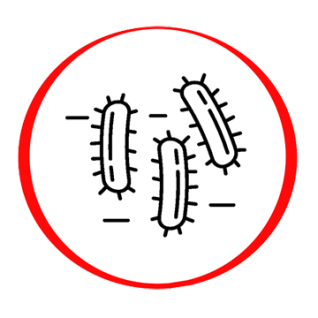Blood take service 5.00€

Determination of pertussis (Bordatella pertussis) respiratory tract infections from throat swabs by PCR method
60.00€
The validity period of online orders: 3 months from the purchase date.
Whooping cough is caused by the bacterium Bordetella pertussis, which settles in the upper respiratory tract and releases toxins that cause the symptoms characteristic of whooping cough. Whooping cough is transmitted from a sick person through airborne droplets: by talking, sneezing, and especially by coughing. The disease is often spread by adults who do not even know that they have whooping cough, because their symptoms are weaker, so whooping cough is often confused with other diseases of the upper respiratory tract.
A person with whooping cough spreads the disease for about 20 days, that is, from the onset of the first symptoms to 2 weeks after the onset of coughing fits characteristic of whooping cough. Whooping cough usually occurs during the cold season - late autumn, winter or early spring. Whooping cough mostly affects children aged 1-5 years, but newborns and babies are also very susceptible to this disease.
In Lithuania, children are vaccinated against whooping cough according to the preventive vaccination calendar 2; 4; 6; Children aged 18 months and then 6-7 years. After vaccination, immunity lasts only for about 10 years, after getting sick - about 7 years (depends on the immune system). Immunity to whooping cough begins to weaken little by little after 2 years after vaccination or re-infection. Due to the relatively short-lasting immunity and the fact that pertussis is believed to spread mostly among adults, many countries suggest revaccinating teenagers and adults, as well as pregnant women and their family members). Since 2015, 15-16-year-old teenagers have been revaccinated free of charge in Lithuania.
Revaccination is especially recommended for parents who have small children or intend to have them, as well as other family members - teenagers and grandparents. Because the majority of babies and young children (according to statistics, 80% of babies get whooping cough, which is very dangerous for them, from adult family members) have this infection with complications: dehydration; apnea (short-term cessation of breathing) - occurs in 61%); pneumonia – 23 percent; convulsions (strong uncontrollable convulsions) -1.1%; death - 1 percent
Symptoms:
For 1-2 weeks, the symptoms of whooping cough resemble many colds - the patient has a runny nose, sneezes, a slight fever, and a slight itch. During this stage, whooping cough is often mistaken for a common cold.
As the disease progresses, a phase of whooping cough attacks begins, which lasts 1-6 weeks, but can last up to 10 weeks. There may be several to a dozen or even several dozen attacks per day, which increase in frequency and become stronger at night. During an attack, the cough is dry, spasmodic, very intense, the patient may begin to choke, vomit, become very tired, scared. It is true that since the immune system of teenagers and adults is stronger, they transmit this disease more easily, the cough can be quite common, serious and very tiring coughing attacks may not occur.
Recovery from whooping cough takes a long time, the recovery stage lasts 2-6 weeks, sometimes several months. However, it can recur at any time, especially if you catch a cold or respiratory infection.
Diagnosis:
Tests performed to detect whooping cough:
BKT (lymphocyte count increases)
Bacteriological examination of a culture from the nasopharynx
Bordetella pertussis antibodies IgA - appear only during the disease, 3-6 weeks after the onset of symptoms
Bordetella pertussis antibodies IgG - appear 4 weeks after the onset of symptoms and indicate an existing pertussis infection or previous vaccination. This test is recommended to be performed together with the IgA antibody test.
Making a diagnosis of whooping cough:
For a child, whooping cough can be suspected if there are repeated frequent and extremely tiring, intense coughing fits that intensify at night.
For an adult, the symptoms of the disease are not so obvious, but if the cough lasts for 2 weeks or longer, tests should be performed.

Reference: 19541
60.00€






